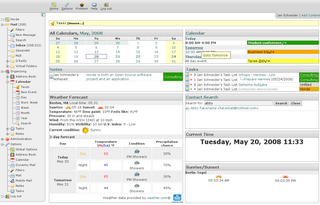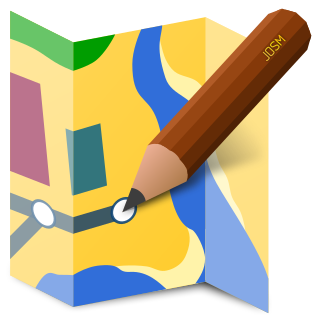
Debian, also known as Debian GNU/Linux, is a Linux distribution composed of free and open-source software, developed by the community-supported Debian Project, which was established by Ian Murdock on August 16, 1993. The first version of Debian (0.01) was released on September 15, 1993, and its first stable version (1.1) was released on June 17, 1996. The Debian Stable branch is the most popular edition for personal computers and servers. Debian is also the basis for many other distributions, like PureOS, Ubuntu, Pardus, Linux Mint.

A Linux distribution is an operating system made from a software collection that includes the Linux kernel, and often a package management system. Linux users usually obtain their operating system by downloading one of the Linux distributions, which are available for a wide variety of systems ranging from embedded devices and personal computers to powerful supercomputers.

Wolfram Mathematica is a software system with built-in libraries for several areas of technical computing that allow machine learning, statistics, symbolic computation, data manipulation, network analysis, time series analysis, NLP, optimization, plotting functions and various types of data, implementation of algorithms, creation of user interfaces, and interfacing with programs written in other programming languages. It was conceived by Stephen Wolfram, and is developed by Wolfram Research of Champaign, Illinois. The Wolfram Language is the programming language used in Mathematica. Mathematica 1.0 was released on June 23, 1988 in Champaign, Illinois and Santa Clara, California.
Nanoscale Molecular Dynamics is computer software for molecular dynamics simulation, written using the Charm++ parallel programming model. It is noted for its parallel efficiency and is often used to simulate large systems. It has been developed by the collaboration of the Theoretical and Computational Biophysics Group (TCB) and the Parallel Programming Laboratory (PPL) at the University of Illinois Urbana–Champaign.

R is a programming language for statistical computing and graphics supported by the R Core Team and the R Foundation for Statistical Computing. Created by statisticians Ross Ihaka and Robert Gentleman, R is used among data miners, bioinformaticians and statisticians for data analysis and developing statistical software. The core R language is augmented by a large number of extension packages containing reusable code and documentation.
The GNU Scientific Library is a software library for numerical computations in applied mathematics and science. The GSL is written in C; wrappers are available for other programming languages. The GSL is part of the GNU Project and is distributed under the GNU General Public License.
Technical variations of Linux distributions include support for different hardware devices and systems or software package configurations. Organizational differences may be motivated by historical reasons. Other criteria include security, including how quickly security upgrades are available; ease of package management; and number of packages available.
Statistica is an advanced analytics software package originally developed by StatSoft and currently maintained by TIBCO Software Inc. Statistica provides data analysis, data management, statistics, data mining, machine learning, text analytics and data visualization procedures.
Ordination or gradient analysis, in multivariate analysis, is a method complementary to data clustering, and used mainly in exploratory data analysis. In contrast to cluster analysis, ordination orders quantities in a latent space. In the ordination space, quantities that are near each other share attributes, and dissimilar objects are farther from each other. Such relationships between the objects, on each of several axes or latent variables, are then characterized numerically and/or graphically in a biplot.

Horde is a free web-based groupware.
A software repository, or repo for short, is a storage location for software packages. Often a table of contents is also stored, along with metadata. A software repository is typically managed by source or version control, or repository managers. Package managers allow automatically installing and updating repositories, sometimes called "packages".

Leland Wilkinson was an American statistician and computer scientist at H2O.ai and Adjunct Professor of Computer Science at University of Illinois at Chicago. Wilkinson developed the SYSTAT statistical package in the early 1980s, sold it to SPSS in 1995, and worked at SPSS for 10 years recruiting and managing the visualization team. He left SPSS in 2008 and became Executive VP of SYSTAT Software Inc. in Chicago. He then served as the VP of Data Visualization at Skytree, Inc and VP of Statistics at Tableau Software before joining H2O.ai. His research focused on scientific visualization and statistical graphics. In these communities he was well known for his book The Grammar of Graphics, which was the foundation for the R package ggplot2.
Revolution Analytics is a statistical software company focused on developing open source and "open-core" versions of the free and open source software R for enterprise, academic and analytics customers. Revolution Analytics was founded in 2007 as REvolution Computing providing support and services for R in a model similar to Red Hat's approach with Linux in the 1990s as well as bolt-on additions for parallel processing. In 2009 the company received nine million in venture capital from Intel along with a private equity firm and named Norman H. Nie as their new CEO. In 2010 the company announced the name change as well as a change in focus. Their core product, Revolution R, would be offered free to academic users and their commercial software would focus on big data, large scale multiprocessor computing, and multi-core functionality.
Long-term support (LTS) is a product lifecycle management policy in which a stable release of computer software is maintained for a longer period of time than the standard edition. The term is typically reserved for open-source software, where it describes a software edition that is supported for months or years longer than the software's standard edition.

Fldigi is a free and open-source program which allows an ordinary computer's sound card to be used as a simple two-way data modem. The software is mostly used by amateur radio operators who connect the microphone and headphone connections of an amateur radio SSB or FM transceiver to the computer's headphone and microphone connections, respectively.

JOSM(Java OpenStreetMap editor) is a free software desktop editing tool for OpenStreetMap geodata created in Java, originally developed by Immanuel Scholz and currently maintained by Dirk Stöcker. The editing tool contains advanced features that are not present in OSM's default online editor, iD.
Bibliometrix is a package for the R statistical programming language for quantitative research in scientometrics and bibliometrics.

rnn is an open-source machine learning framework that implements recurrent neural network architectures, such as LSTM and GRU, natively in the R programming language, that has been downloaded over 100,000 times.

R packages are extensions to the R statistical programming language. R packages contain code, data, and documentation in a standardised collection format that can be installed by users of R, typically via a centralised software repository such as CRAN. The large number of packages available for R, and the ease of installing and using them, has been cited as a major factor driving the widespread adoption of the language in data science.










